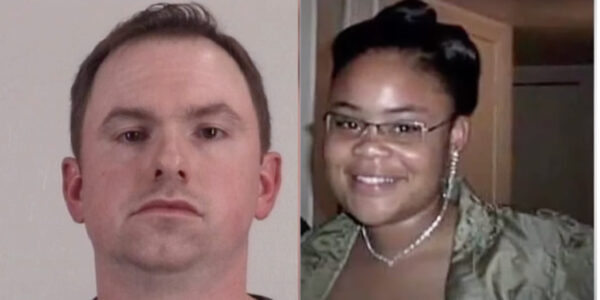The ex-Fort Worth police officer who fatally shot Atatiana Jefferson, a Black woman whose only crime was letting her nephew play video games way past his bedtime, was sentenced to 11 years and 10 months for her death on Tuesday.
Aaron Dean, who is white, was found guilty by a Tarrant County jury of manslaughter on Thursday for the October 2019 shooting of the woman in her home.

Dean pleaded not guilty to murder, the original charge, which could have landed him from five to 99 years behind bars. However, on Wednesday, Dec. 14, the jurors were instructed to only consider murder or the lesser offense of manslaughter, according to CNN.
The jurors had to determine whether a reasonable person in the officer’s shoes would have responded with the same lethal force.
Judge George Gallagher said the jury deliberated 13 hours and came to a verdict around 2 p.m. on Thursday.
The sentencing phase of his trial is set for Friday, Dec. 16.
Not long after 2:30 a.m. on Oct 12, 2019, Jefferson and her then-8-year-old nephew were playing video games when she heard a noise outside of her home. In response, she grabbed her firearm and went to look out of her bedroom window. Unbeknownst to her, her neighbor had called the police on a nonemergency line for a wellness check on her. Her front door was open and he was concerned.
Testimony said the reason why the door was open was because Jefferson and her nephew were cooking and burnt the hamburgers and opened the doors to get the smoke out and help with ventilation.
Dean was one of the two officers who responded, and rather than announcing themselves at the front door, the two began walking the perimeter of the residence. When Jefferson armed herself and went to the window to investigate the sound of rustling from outside, Dean hastily shot her after seeing her with the weapon. Body camera footage showed the officer calling to her to put her arms up, but he did not identify himself as police before firing a single shot through the window, fatally wounding Jefferson.
Zion Carr was one of two witnesses to Jefferson’s death. Now, 11, he shared the last moments of her life during the two-week trial, saying, “She started crying.”
The other witness was Dean’s partner, who said the two thought they were responding to a burglary.
Dean said he shot the woman in self-defense because she pointed a gun at him. The prosecutor argued that forensics tells a different story.
There were no glass injuries on Jefferson’s hands, the lawyers noted, adding the way the bullet went through her body was as if she had been crouching. Had she been aiming to fire a weapon, they argued, she would have been standing up when struck and her hands hit by some glass fragments.
The New York Times reports the nephew saw Jefferson collapse near the window, letting out a moan, before dying.
Carr said, “I was thinking, is it a dream?”
WFAA reported in his closing arguments, Daniel Smith, the prosecutor, said to the jury, “If you can’t feel safe in your own home, where can you feel safe?”
“The power you have today is to hold him responsible, it’s to tell them [Atatiana’s family] that it all wasn’t in vain, it’s to say that she [Atatiana] matters,” the prosecution noted, arguing Dean violated his police training, general orders, and abused the power of his badge when he fired his weapon at the woman. “They matter, eastside matters. To say that we protect everyone.”
Dean’s attorney Bob Gill’s closing statement sought to paint the shooting as a tragic accident based on a split-second decision to protect himself.
“A tragedy doesn’t always equal a crime; it doesn’t always equal a law violation,” said Gill, before saying when the officer came to her property and saw her lawfully in her home with her gun, her rights were suspended.
“She [Atatiana] pointed a firearm at a Fort Worth police officer,” Dean maintained. “The rights stop there,” Gill said. “It’s a crime and it’s an unlawful act.”
He also tried to discredit the minor’s testimony, suggesting his recollection may have been coerced by the prosecution.
“Zion Carr’s testimony took a different turn,” Gill floated to the jury. “You could tell he was under a lot of pressure and a lot of time had passed. Zion succumbed to the pressure and testified differently.”
For Gill, his client had no choice but to shoot. His life was in danger, at least he thought it was.
Dean’s lawyer continued the “he had no choice” defense, despite his client giving a verbal assessment of his performance on the job the night he killed Jefferson and saying to jurors he “could’ve been better.”
Smith was able to rebut Gill’s comments, rendering the last voice on the matter, pressing Jefferson’s “only crime was love and protection for her nephew, not pointing a gun at a Fort Worth police officer.”
Adding, “A tragedy, an accident that’s spilling your milk at breakfast. … This is murder.”
The verdict did not evoke a huge response from the family, who showed no emotions after hearing Dean would be held accountable for Jefferson’s death.
“We’re glad there was a guilty verdict. That’s progress,” the Rev. Crystal Bates said.
“But there’s so much work to be done,” the minister and activist remarked. “How he is sentenced is going to send a message not only to him but to other law enforcement to not be so trigger happy when you see somebody of color.”
The hesitancy to celebrate the victory could be because of the outcome of another similar Texas police-involved killing that happened almost two weeks before Jefferson’s death.
Former officer Amber Guyger shot and killed Botham Jean while he was in his house also. Though she was convicted, she only received a sentence of 10 years for taking the young man’s life.
Dean, who also showed no emotion as the verdict was read, will remain in custody at the Tarrant County jail until Gallagher sentences him, ending the three-year ordeal surrounding justice for Atatiana Jefferson.


